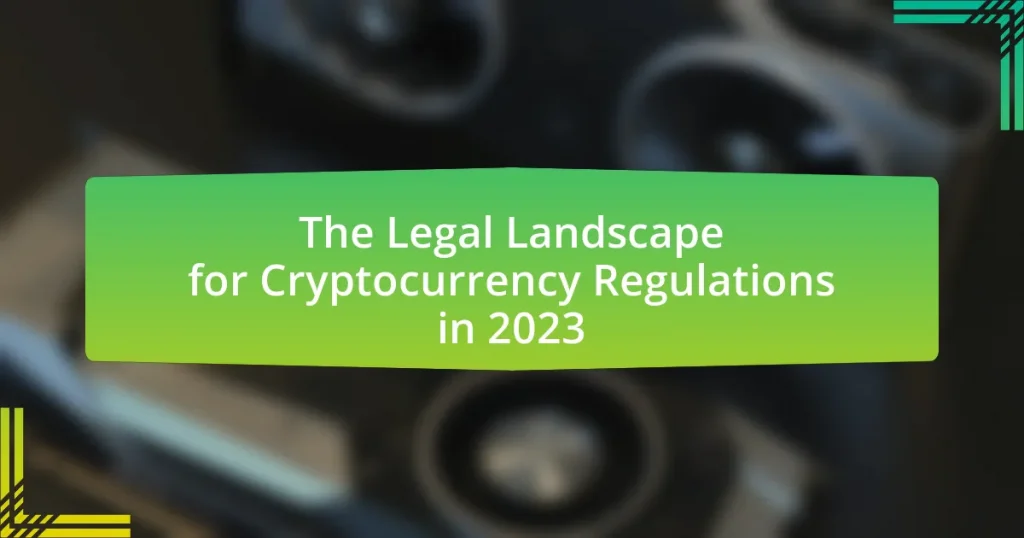The legal landscape for cryptocurrency regulations in 2023 is marked by heightened scrutiny and the development of clearer frameworks across various jurisdictions, including significant actions by the U.S. Securities and Exchange Commission (SEC) and the European Union’s Markets in Crypto-Assets (MiCA) regulation. Recent years have seen a shift towards stricter regulations aimed at addressing fraud, consumer protection, and anti-money laundering, influenced by key events such as the 2017 ICO boom and the rise of decentralized finance (DeFi). Different countries adopt varying regulatory approaches, with the U.S. employing a fragmented system while others, like El Salvador, embrace cryptocurrencies more openly. Understanding these regulations is crucial for stakeholders to navigate the complex legal environment and mitigate risks associated with investment and compliance.

What is the Legal Landscape for Cryptocurrency Regulations in 2023?
The legal landscape for cryptocurrency regulations in 2023 is characterized by increased scrutiny and evolving frameworks across various jurisdictions. Governments and regulatory bodies, such as the U.S. Securities and Exchange Commission (SEC) and the European Union, are actively working to establish clearer guidelines to address issues like consumer protection, anti-money laundering, and taxation. For instance, the SEC has intensified its enforcement actions against unregistered securities offerings in the crypto space, while the EU is advancing its Markets in Crypto-Assets (MiCA) regulation to create a comprehensive regulatory framework. This shift reflects a global trend towards formalizing the legal status of cryptocurrencies and ensuring compliance with existing financial regulations.
How have cryptocurrency regulations evolved in recent years?
Cryptocurrency regulations have evolved significantly in recent years, with many countries implementing stricter frameworks to address issues such as fraud, money laundering, and consumer protection. For instance, the Financial Action Task Force (FATF) updated its guidelines in 2019 to include virtual assets, urging member countries to regulate cryptocurrency exchanges and implement Know Your Customer (KYC) protocols. Additionally, the United States has seen increased scrutiny from agencies like the Securities and Exchange Commission (SEC) and the Commodity Futures Trading Commission (CFTC), which have taken action against unregistered securities offerings and fraudulent schemes. In the European Union, the Markets in Crypto-Assets (MiCA) regulation is set to provide a comprehensive legal framework for cryptocurrencies, aiming for implementation by 2024. These developments reflect a global trend towards more robust regulatory oversight in the cryptocurrency sector.
What key events have influenced regulatory changes?
Key events that have influenced regulatory changes in cryptocurrency include the 2008 publication of the Bitcoin whitepaper by Satoshi Nakamoto, which introduced decentralized digital currency concepts. The 2017 Initial Coin Offering (ICO) boom prompted regulatory scrutiny, leading to the SEC’s guidance on token sales. Additionally, the collapse of major exchanges like Mt. Gox in 2014 highlighted security vulnerabilities, prompting calls for stricter regulations. The 2020 Financial Action Task Force (FATF) guidelines on virtual assets further shaped global regulatory frameworks. These events collectively underscored the need for enhanced oversight and consumer protection in the cryptocurrency sector.
How do different countries approach cryptocurrency regulation?
Different countries approach cryptocurrency regulation with varying degrees of acceptance and frameworks. For instance, the United States employs a fragmented regulatory approach, where agencies like the SEC and CFTC oversee different aspects of cryptocurrency, leading to a complex legal environment. In contrast, countries like El Salvador have embraced Bitcoin as legal tender, promoting its use and integration into the economy. Meanwhile, China has taken a stringent stance by banning cryptocurrency transactions and mining, citing financial stability concerns. The European Union is working towards a comprehensive regulatory framework through the Markets in Crypto-Assets (MiCA) proposal, aiming to create a unified approach across member states. These diverse regulatory strategies reflect each country’s economic priorities, risk tolerance, and technological adoption levels.
Why is understanding cryptocurrency regulations important for stakeholders?
Understanding cryptocurrency regulations is crucial for stakeholders because it directly impacts their ability to operate legally and effectively within the market. Stakeholders, including investors, businesses, and regulators, must navigate a complex and evolving legal framework that varies by jurisdiction. For instance, in 2023, the Financial Action Task Force (FATF) guidelines emphasize compliance with anti-money laundering (AML) and counter-terrorism financing (CTF) measures, which require stakeholders to implement robust compliance programs. Failure to understand and adhere to these regulations can result in significant legal penalties, loss of market access, and reputational damage. Therefore, a comprehensive understanding of cryptocurrency regulations enables stakeholders to mitigate risks, seize opportunities, and ensure sustainable growth in the dynamic cryptocurrency landscape.
What risks do investors face without proper regulations?
Investors face significant risks without proper regulations, including fraud, market manipulation, and lack of consumer protection. The absence of regulatory frameworks allows unscrupulous actors to exploit investors through Ponzi schemes or misleading information, as evidenced by the rise of fraudulent Initial Coin Offerings (ICOs) that have resulted in billions of dollars in losses. Furthermore, without regulations, the cryptocurrency market can experience extreme volatility driven by speculative trading, which can lead to substantial financial losses for investors. A study by the University of Cambridge highlighted that over 75% of cryptocurrency users have encountered scams, underscoring the urgent need for regulatory oversight to safeguard investor interests.
How do regulations impact the growth of the cryptocurrency market?
Regulations significantly impact the growth of the cryptocurrency market by establishing a framework that can either foster innovation or stifle development. For instance, clear regulatory guidelines can enhance investor confidence, leading to increased participation and investment in cryptocurrencies; a study by the Cambridge Centre for Alternative Finance in 2021 indicated that regulatory clarity correlates with higher market capitalization and user adoption rates. Conversely, overly restrictive regulations can hinder market growth by limiting access to financial services and creating barriers for new entrants, as seen in countries like China, where strict bans on cryptocurrency trading led to a substantial decline in market activity. Thus, the nature and implementation of regulations play a crucial role in shaping the trajectory of the cryptocurrency market.

What are the current regulatory frameworks for cryptocurrencies in 2023?
The current regulatory frameworks for cryptocurrencies in 2023 vary significantly across jurisdictions, with countries like the United States implementing a mix of federal and state regulations, while the European Union is advancing its Markets in Crypto-Assets (MiCA) regulation to create a unified framework. In the U.S., the Securities and Exchange Commission (SEC) and the Commodity Futures Trading Commission (CFTC) oversee different aspects of cryptocurrency regulation, focusing on securities laws and derivatives, respectively. Meanwhile, the EU’s MiCA aims to provide clarity on the legal status of cryptocurrencies, ensuring consumer protection and market integrity. Countries such as China have adopted strict bans on cryptocurrency transactions, while others like El Salvador have embraced Bitcoin as legal tender. These diverse approaches reflect ongoing debates about the balance between innovation and consumer protection in the rapidly evolving cryptocurrency landscape.
Which countries have implemented significant cryptocurrency regulations?
Countries that have implemented significant cryptocurrency regulations include the United States, the European Union, Japan, and Singapore. The United States has established a regulatory framework through agencies like the SEC and CFTC, focusing on securities laws and anti-money laundering. The European Union has proposed the Markets in Crypto-Assets (MiCA) regulation, aiming for a comprehensive regulatory approach across member states. Japan has recognized cryptocurrencies as legal tender and has a licensing system for exchanges, ensuring consumer protection. Singapore has enacted the Payment Services Act, regulating digital payment tokens and providing a clear licensing framework for cryptocurrency businesses.
What are the specific regulations in the United States?
The specific regulations in the United States regarding cryptocurrency include the Securities and Exchange Commission (SEC) guidelines, which classify certain cryptocurrencies as securities, thus subjecting them to federal securities laws. The Commodity Futures Trading Commission (CFTC) also regulates cryptocurrency derivatives and treats Bitcoin and Ethereum as commodities. Additionally, the Financial Crimes Enforcement Network (FinCEN) requires cryptocurrency exchanges to register as money services businesses and comply with anti-money laundering (AML) regulations. The Internal Revenue Service (IRS) mandates that cryptocurrencies be treated as property for tax purposes, requiring reporting of capital gains. These regulations are designed to protect investors and ensure market integrity while fostering innovation in the cryptocurrency space.
How do European Union regulations differ from those in Asia?
European Union regulations on cryptocurrency emphasize consumer protection, anti-money laundering, and market integrity, while Asian regulations vary significantly by country, often prioritizing innovation and economic growth. The EU’s Markets in Crypto-Assets (MiCA) framework aims to create a unified regulatory environment across member states, focusing on transparency and investor safeguards. In contrast, countries like Singapore adopt a more flexible approach, encouraging blockchain innovation through regulatory sandboxes, while others, such as China, impose strict bans on cryptocurrency transactions and Initial Coin Offerings (ICOs). This divergence reflects differing priorities: the EU seeks to harmonize regulations for safety and stability, whereas Asian nations balance regulation with fostering technological advancement.
What role do international organizations play in cryptocurrency regulation?
International organizations play a crucial role in cryptocurrency regulation by establishing frameworks and guidelines that promote cooperation among countries. These organizations, such as the Financial Action Task Force (FATF) and the International Monetary Fund (IMF), provide recommendations for anti-money laundering (AML) and combating the financing of terrorism (CFT) that member states are encouraged to adopt. For instance, the FATF’s 2019 guidance on virtual assets outlines how countries should regulate cryptocurrency exchanges and wallet providers to mitigate risks associated with illicit activities. This collaborative approach helps harmonize regulations across jurisdictions, facilitating a more stable and secure global cryptocurrency market.
How does the Financial Action Task Force (FATF) influence regulations?
The Financial Action Task Force (FATF) influences regulations by establishing international standards aimed at combating money laundering and terrorist financing. These standards, known as the FATF Recommendations, serve as a framework for countries to develop their own regulatory measures. For instance, the FATF’s 2019 guidance on virtual assets and virtual asset service providers has prompted many jurisdictions to implement stricter compliance requirements for cryptocurrency exchanges and wallet providers. This guidance has led to increased scrutiny and regulation of the cryptocurrency sector, as countries align their laws with FATF recommendations to avoid being placed on the FATF’s “grey” or “black” lists, which can result in economic sanctions and reduced international cooperation.
What guidelines has the International Monetary Fund (IMF) proposed?
The International Monetary Fund (IMF) has proposed guidelines focused on the regulation of cryptocurrencies to ensure financial stability and consumer protection. These guidelines emphasize the need for a comprehensive regulatory framework that addresses risks associated with digital assets, including the potential for financial crime, market volatility, and the safeguarding of investor interests. The IMF advocates for a balanced approach that fosters innovation while mitigating risks, suggesting that countries should adopt regulations that are adaptable to the rapidly evolving nature of cryptocurrencies.

What challenges do regulators face in the cryptocurrency space?
Regulators face significant challenges in the cryptocurrency space, primarily due to the rapid evolution of technology and the decentralized nature of digital assets. The lack of a unified regulatory framework across jurisdictions complicates enforcement and compliance, as different countries have varying approaches to cryptocurrency regulation. For instance, while some nations embrace cryptocurrencies, others impose strict bans, creating a fragmented regulatory environment. Additionally, the anonymity associated with many cryptocurrencies poses risks related to money laundering and fraud, making it difficult for regulators to track illicit activities. Furthermore, the pace of innovation in the cryptocurrency sector often outstrips regulatory responses, leading to gaps in oversight and potential consumer protection issues. These challenges highlight the need for adaptive regulatory strategies that can keep pace with technological advancements while ensuring market integrity and consumer safety.
How do technological advancements complicate regulation?
Technological advancements complicate regulation by introducing rapid changes that outpace existing legal frameworks. For instance, the emergence of decentralized finance (DeFi) platforms challenges traditional regulatory approaches, as these platforms operate without central authorities, making it difficult for regulators to enforce compliance. Additionally, the use of blockchain technology in cryptocurrencies creates transparency but also raises concerns about privacy and security, complicating the ability to monitor transactions effectively. The speed of innovation in areas such as smart contracts and tokenization further exacerbates these challenges, as regulators struggle to keep up with new developments and their implications for consumer protection and financial stability.
What are the implications of decentralized finance (DeFi) on regulation?
Decentralized finance (DeFi) significantly complicates regulatory frameworks due to its inherent lack of centralized control and the pseudonymous nature of transactions. This decentralization challenges traditional regulatory approaches, as it becomes difficult for authorities to identify responsible parties and enforce compliance. For instance, the Financial Action Task Force (FATF) has highlighted the need for regulations that adapt to the unique characteristics of DeFi, emphasizing the importance of addressing anti-money laundering (AML) and know-your-customer (KYC) requirements in a decentralized context. Additionally, the rapid growth of DeFi platforms has prompted regulators to consider new legal definitions and classifications for financial products, which could lead to a more fragmented regulatory environment across jurisdictions.
How does the anonymity of cryptocurrencies pose regulatory challenges?
The anonymity of cryptocurrencies poses significant regulatory challenges by enabling illicit activities such as money laundering and tax evasion. This anonymity complicates the ability of regulatory bodies to trace transactions and identify individuals involved, which is essential for enforcing laws and regulations. For instance, the Financial Action Task Force (FATF) has highlighted that the pseudonymous nature of cryptocurrencies can hinder compliance with anti-money laundering (AML) and combating the financing of terrorism (CFT) regulations. As a result, regulators struggle to implement effective oversight and ensure that cryptocurrency exchanges adhere to necessary reporting requirements, leading to potential gaps in the financial system that can be exploited by criminals.
What are the common criticisms of current cryptocurrency regulations?
Common criticisms of current cryptocurrency regulations include their lack of clarity, inconsistency across jurisdictions, and potential stifling of innovation. Critics argue that vague definitions and ambiguous guidelines create uncertainty for businesses and investors, hindering market growth. Additionally, the fragmented regulatory landscape, where different countries impose varying rules, complicates compliance for global operations. Furthermore, some regulations are perceived as overly restrictive, potentially limiting the development of new technologies and applications within the cryptocurrency space. These criticisms highlight the need for more coherent and balanced regulatory frameworks that foster innovation while ensuring consumer protection and financial stability.
How do regulations affect innovation in the cryptocurrency sector?
Regulations significantly impact innovation in the cryptocurrency sector by establishing frameworks that can either foster or hinder development. For instance, clear regulatory guidelines can enhance investor confidence, leading to increased funding and innovation, as seen in jurisdictions like Switzerland, which has attracted numerous blockchain startups due to its supportive regulatory environment. Conversely, overly stringent regulations can stifle creativity and limit the ability of new projects to emerge, as evidenced by the decline in initial coin offerings (ICOs) in regions with strict compliance requirements. Thus, the balance of regulation is crucial; effective regulations can promote innovation while excessive restrictions can impede it.
What are the arguments for and against stricter regulations?
Arguments for stricter regulations include the need for consumer protection, prevention of fraud, and the promotion of market stability. Stricter regulations can safeguard investors from scams, as evidenced by the rise in cryptocurrency-related fraud cases, which reached $14 billion in 2021 according to the Federal Trade Commission. Additionally, regulations can enhance the legitimacy of the cryptocurrency market, attracting institutional investors and fostering overall market growth.
Conversely, arguments against stricter regulations highlight the potential stifling of innovation and the risk of driving cryptocurrency activities underground. Critics argue that excessive regulation may hinder the development of blockchain technology and limit access to financial services for unbanked populations. A report by the World Economic Forum suggests that overly stringent regulations could push cryptocurrency businesses to relocate to more favorable jurisdictions, ultimately reducing the competitive edge of domestic markets.
What best practices should stakeholders follow regarding cryptocurrency regulations?
Stakeholders should prioritize compliance with existing laws and regulations to ensure the legitimacy of cryptocurrency operations. This includes understanding and adhering to anti-money laundering (AML) and know your customer (KYC) requirements, which are critical for preventing illicit activities. For instance, the Financial Action Task Force (FATF) has established guidelines that many countries follow, emphasizing the need for transparency and accountability in cryptocurrency transactions. Additionally, stakeholders should engage with regulatory bodies to stay informed about evolving regulations and participate in discussions that shape the regulatory framework. This proactive approach not only mitigates legal risks but also fosters trust among users and investors, ultimately contributing to a more stable cryptocurrency market.
How can investors stay informed about regulatory changes?
Investors can stay informed about regulatory changes by regularly monitoring official government websites, subscribing to industry newsletters, and following reputable financial news outlets. Government websites, such as the U.S. Securities and Exchange Commission (SEC) or the Financial Conduct Authority (FCA) in the UK, provide direct updates on regulatory changes affecting cryptocurrency. Industry newsletters, like those from CoinDesk or CoinTelegraph, often summarize and analyze these changes, making them accessible to investors. Additionally, reputable financial news outlets, such as Bloomberg or Reuters, report on significant regulatory developments, ensuring that investors receive timely information. This multi-faceted approach allows investors to remain aware of the evolving legal landscape surrounding cryptocurrency regulations in 2023.
What steps can businesses take to ensure compliance with regulations?
Businesses can ensure compliance with regulations by implementing a comprehensive compliance program that includes regular training, risk assessments, and monitoring of regulatory changes. A compliance program should establish clear policies and procedures that align with applicable laws, such as the Financial Action Task Force (FATF) guidelines for cryptocurrency transactions. Regular training sessions for employees on these policies can enhance awareness and adherence. Conducting risk assessments helps identify potential compliance gaps, while staying updated on regulatory changes ensures that businesses adapt their practices accordingly. According to a 2022 report by the International Monetary Fund, organizations that actively engage in compliance measures reduce the risk of legal penalties and enhance their operational integrity.






